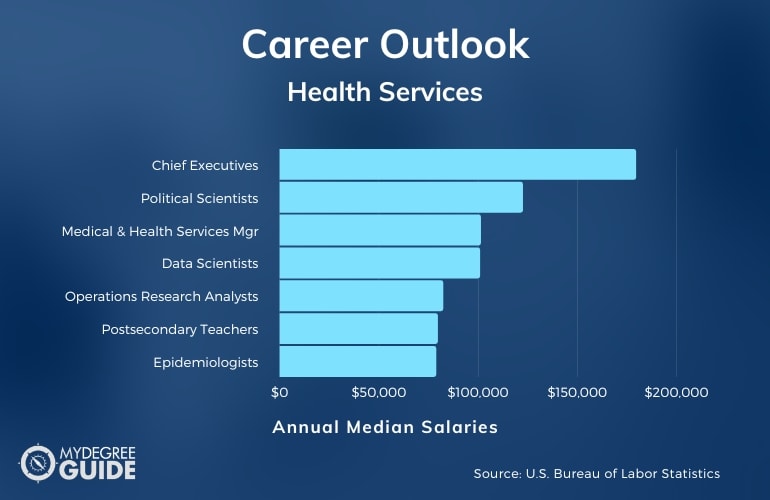A PhD in Health Services Research program could help you prepare for a career investigating complex issues that affect health services and public health.

Health services researchers study how economics, individual behavior, social structures, technology, and other factors influence the healthcare system. They analyze systemic problems like addiction, health disparities, and mental health disorders. Researchers in this field can also play a vital role in shaping public health policies.
Editorial Listing ShortCode:
If you enjoy data, medicine, and research, enrolling in an online PhD in Health Services Research program could be a strategic career move.
Online PhD in Health Services Research Programs

Health services research is a multidisciplinary field that uses qualitative and quantitative research methods to study and generate solutions for problems in the healthcare system.
Researchers examine how behavioral, cultural, economic, ethical, and political frameworks impact health services as well as people’s access to them. For example, a researcher could explore how economic inequalities in rural regions affect access to medical services, the cost of care, and patient outcomes.
Editorial Listing ShortCode:
Online health services doctoral programs prepare students to analyze and address the most urgent problems in healthcare today. Possible research areas include addiction, health disparities, immigrant health, maternal and child health policy, and population mental health.
Health services researchers draw on approaches and theories from many disciplines to investigate these complicated issues. Some of the topics that you may study during your PhD program include:
- Biostatistics
- Epidemiology
- Grant writing
- Health economics
- Health systems management
- Human rights
- Implementation science
- Medical technology
- Public health
- Quantitative research methods
- Research ethics
- Social and behavioral medicine
Throughout your doctoral studies, you’ll also have opportunities to hone your research skills inside and outside the online classroom. For instance, you may complete research-based course projects, applied research apprenticeships, and independent studies.
Most PhD in Health Services Research programs also require students to conduct original research and write a dissertation. Many doctorate holders remain in academia as instructors, postdoctoral fellows, and researchers. Other graduates secure positions in government agencies, private health-related corporations, or nonprofit organizations.
Possible job titles for professionals who hold a PhD in Health Services Research include:
- Core investigator
- Health policy consultant
- Program analyst
- Public health policy analyst
- Research director
- Health services researcher
- Senior policy manager
- University professor
If you have specific career goals, you could consider enrolling in an online health services research PhD program that offers relevant concentrations or graduate certificates. Possible areas of specialization in your online health services degree program may include bioinformatics, epidemiology, and health policy. Selecting a health services PhD program that allows you to pursue your research interests can help prepare you for your preferred career path.
Health Services Careers & Salaries

Demand for medical services has recently surged due to the aging population, public health crises like the COVID-19 pandemic, and other phenomena.
As a result, many organizations and political leaders have made it a priority to solve issues that impact healthcare access, equity, and policy. These groups often seek to hire skilled researchers who have graduated from healthcare PhD programs.
According to the Bureau of Labor Statistics, many careers associated with health services research pay above average wages and are projected to have faster than average job growth.
| Careers | Annual Median Salaries |
| Chief Executives | $179,520 |
| Political Scientists | $122,510 |
| Medical and Health Services Managers | $101,340 |
| Data Scientists | $100,910 |
| Operations Research Analysts | $82,360 |
| Postsecondary Teachers | $79,640 |
| Epidemiologists | $78,830 |
| Health Education Specialists | $60,600 |
| Survey Researchers | $59,740 |
| Clinical Laboratory Technologists and Technicians | $57,800 |
Your actual wage will depend on your employer, location, work experience, and other factors. The positions you can qualify for will also depend on your prior education, experience, and skill sets.
A doctorate in health services research can position you to take on a role in numerous industries and organizations. Potential work settings include hospitals, insurance companies, pharmaceutical companies, and other health systems.
Editorial Listing ShortCode:
Health services research professionals can also work for universities, research facilities, public health centers, nonprofit foundations, and federal and state government agencies.
Health Services Research PhD Curriculum & Courses

All online PhD programs in healthcare services research have unique curricula shaped by degree requirements, faculty expertise, and available concentrations. Here are some examples of courses you may be required to take:
- Clinical Outcomes Research: You’ll conduct clinical research using observational studies, randomized clinical trials, and other data-gathering methods.
- Cost Benefit Analysis for Health Services: This course explores the strengths and weaknesses of various approaches for conducting economic assessments of healthcare interventions and services.
- Foundations in Health Services Research: This course provides an overview of health services research scholarship.
- Grant Writing for Public Health Professionals: You can gain foundational grant writing skills and learn how to develop and evaluate budgets, organizational capacity, and partnerships.
- Health Decision Science: You’ll learn how to use quantitative methods like health economics and evidence-based medicine to make challenging decisions related to health services.
- Health and Human Rights: This class examines the intersections between human rights, public health policies, and political and social contexts.
- Legal Aspects of Public Health: You’ll study legal issues that influence the creation and management of public health initiatives.
- Methods in Health Services Research I: You’ll learn empirical techniques for health services research and best practices for implementing these methods.
- Methods in Health Services Research II: This course expands your knowledge of health services research by teaching econometric models and other advanced research methods.
- Policy Analysis for Population Health: You’ll develop strategies to advocate for policy changes, and you’ll conduct research on policy processes and outcomes related to population health.
Along with coursework, you may have the opportunity to complete research practicums or apprenticeships that allow you to develop hands-on research experience.
Admissions Requirements

All PhD in Health Research Services programs require a relevant bachelor’s or master’s degree. Other admissions criteria can vary among programs, but you may be required to submit these common materials:
- Curriculum vitae or resume
- GRE or GMAT test scores (not all programs require them)
- Letters of recommendation
- Personal statement
- Official transcripts
Many online healthcare PhD programs only admit a limited number of students, so competition can be fierce. Tailoring your application materials for each program is a strategic move that could help you stand out as a candidate.
Accreditation

As you research PhD programs, it’s beneficial to check each school’s accreditation status. Colleges with regional accreditation have undergone an external review process to verify that they provide students with a high-quality education.
Enrolling in an accredited doctoral program might make it possible to qualify for certain financial aid opportunities and transfer credits to another accredited school. Plus, many employers often prefer to hire candidates from accredited schools.
Editorial Listing ShortCode:
Many universities list their accreditation status on their website. You can also visit the US Department of Education’s website to find accredited schools.
Financial Aid and Scholarships

When researching health services doctoral programs, you may also want to research financial aid opportunities. You might qualify for financial assistance that can decrease your upfront costs.
Many PhD programs provide graduate students with stipends, tuition waivers, and health insurance. In exchange for this funding package, students might be required to work as teaching assistants for undergraduate courses or to participate in research projects.
You can also complete the FAFSA application to determine your eligibility for federal aid. You may qualify for federal grants and work-study programs. Some PhD students also take out student loans from the federal government.
You may also qualify for scholarship opportunities. Your college might offer scholarships for incoming students who meet certain criteria. Some professional public health organizations also provide scholarships for graduate students studying health services.
What Is Health Services Research?

Health services research is an interdisciplinary field that uses diverse scientific methods and theoretical approaches to study pressing issues in healthcare.
These researchers investigate how complex frameworks—like cultural beliefs and economic systems—impact the accessibility, cost, and effectiveness of healthcare interventions. Many health services research professionals develop areas of expertise. For instance, a researcher may specialize in topics like:
- Healthcare inequalities
- Health economics
- Health policy and management
- Health outcomes measurement
- HIV and HCV
- Systems science methods
- Veteran health
Health services researchers can also play an essential role in guiding and reforming public health policy.
What Can You Do with a PhD in Health Services Research?

A PhD in Health Services Research helps prepare professionals for a range careers. Many PhD holders secure positions in academia as postsecondary teachers or researchers. Other graduates find employment with government agencies, where they can directly shape public health policies and laws.
Consulting firms, nonprofit organizations, and private corporations also hire professionals in this field. Potential roles in this area of expertise include research director, university professor, health services researcher, health policy consultant, policy analyst, and more.
How Long Does It Take to Get a Health Services Research PhD Online?

Most online PhD in Health Services Research programs take 3 to 5 years to complete if you enroll full-time. Most programs require 2 to 3 years of full-time coursework.
Some programs allow students to transfer credits from a master’s program, potentially reducing the time to finish the degree. After finishing your coursework, you’ll likely be required to write and defend a dissertation based on original research. Programs without a dissertation requirement can generally be completed in 3 years with full-time study.
Is a PhD in Health Services Research Worth It?

Yes, a PhD in Health Services Research is worth it for many students. This degree helps prepare you to tackle the issues affecting the healthcare system and public health today. As a researcher, you can play a direct role in developing innovative solutions to complicated healthcare problems, and you can help advocate for improved public health policies.
Editorial Listing ShortCode:
You may find a career in health services research particularly rewarding if you enjoy working with data and science. During your doctoral studies, you’ll have the opportunity to learn about analytical and scientific methods and theories from a range of disciplines.
Universities Offering Online PhD in Health Services Research Degree Programs
Methodology: The following school list is in alphabetical order. To be included, a college or university must be regionally accredited and offer degree programs online or in a hybrid format.

Boston University offers a PhD in Health Services Research. To graduate, students must complete about 42 credits of coursework and a dissertation. Potential courses include Research Theory and Design, Quantitative Methods for Health Services and Other Public Health Research, and Contemporary Structures of Health Services.
Boston University is accredited by the New England Commission of Higher Education.

Florida International University offers a PhD in Public Health with a concentration in Health Systems Research. This 70 credit program uses a hybrid format and is designed to help students finish their dissertations within 4 years. The curriculum focuses on applying systems thinking to improve population health.
Florida International University is accredited by the Southern Association of Colleges and Schools Commission on Colleges.

George Washington University offers a DHSc in Leadership in Clinical Practice and Education. This fully online program requires the completion of 48 credits and can potentially be completed in just 2.5 years. Potential courses include Interprofessional Collaboration in Practice, Practicum I and II, and Program Theory and Health Innovations.
GW is accredited by the Middle States Commission on Higher Education.

Loma Linda University offers an online program for a Doctor of Public Health that is open to applicants with little or no previous experience in the field of public health. Loma Linda’s online courses include synchronous meetings, and students are required to come to campus during the dissertation process. The program usually takes 3 to 5 years to complete.
Loma Linda University is accredited by the Western Association of Schools and Colleges.

The University of South Florida offers a PhD in Public Health with a concentration in Health Services Research. The program requires the completion of at least 55 post-master’s credit hours, including a dissertation. Potential courses include History and Systems of Public Health, Introduction to Research Methods, and Applied Multivariate Statistical Methods.
The University of South Florida is accredited by the Southern Association of Colleges and Schools Commission on Colleges.
Getting Your PhD in Health Services Research Online

Researching issues impacting health services often requires creativity, dedication, and a willingness to experiment with different methodologies.
You might consider earning a PhD in Health Services Research if you’re passionate about decreasing health disparities, improving access to medical services, and helping more people maintain healthy lifestyles. Many health services research PhD programs are available online to offer more flexibility for working professionals.
You can start this next step in your educational journey today by researching accredited colleges and universities that offer online doctoral programs in this field.

